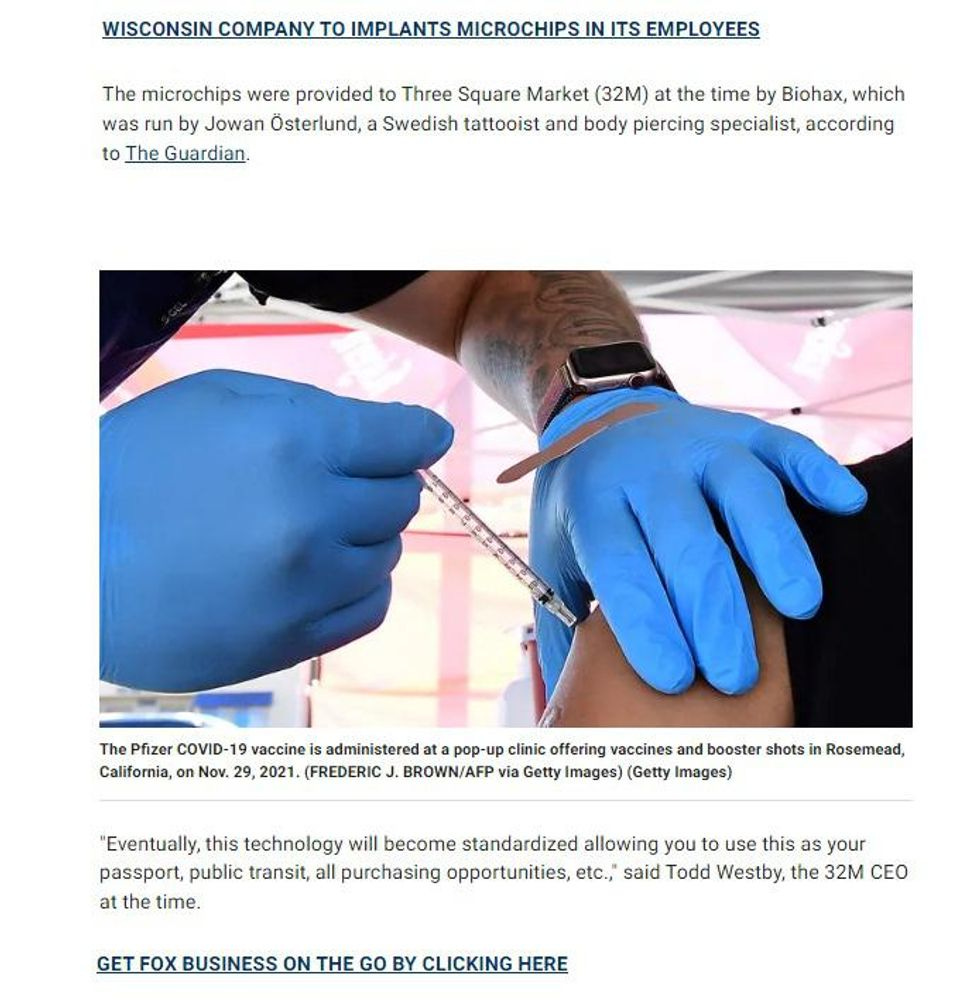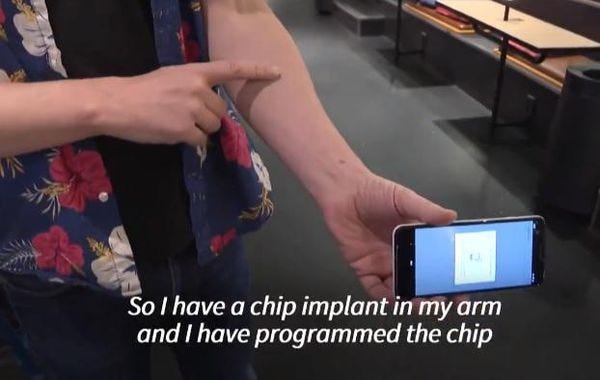Swedish Tech Firm Puts Vaccine Passport On Implantable Microchip, Wait, Put That Axe Down
TOTALLY NOT 666.
A Swedish tech startup has come up with a perfect combination of two things that give the American far Right the heebie-jeebies: Take a vaccination passport and put it on a microchip that's about the size of a grain of rice (long-grained, judging by the pics). The boffins at Epicenter, the Stockholm-based firm, say it could be implanted in your arm, or if you prefer, between your thumb and forefinger so you can just poke at the tiny technolump all day at work.
Here's a video about the device from Agence France-Presse, featuring Epicenter's "Chief Disruption Officer" Hannes Sjöblad, who is absolutely not a James Bond villain, explaining how the technology works and noting that the chip doesn't broadcast anything and can't be used to track you, because that's what your cell phone is for anyway.
A Swedish company has come up with a microchip that can be inserted under the skin so that users can carry their Covid passports in their arm.pic.twitter.com/Vkl82q7dGR
— AFP News Agency (@AFP News Agency) 1640103480
The technology uses the same sort of "near-field communication" (NFC) technolog y that you'd find in a contactless credit card, or indeed in the ID chip a vet might inject in your pet. As Sjöblad explains in the video, the chip itself doesn't have a battery, and needs to be activated by a reader, such as the one in his phone or a device that might be installed at a venue:
They cannot transmit a signal by themselves, so they're basically passive. They sit there asleep. They can never tell your location, they're only activated when you touch them with your smartphone, so this means they cannot be used for tracking anyone's location.
Somewhere in a house where Fox News is on all the time, a guy in a sleeveless undershirt just muttered, "yeah, right" and went back to tinkering with his whole-home Faraday cage that he ordered in a kit.
Sjöblad also emphasized that the implants are entirely voluntary, and are being adopted by people who like doing geeky techie things, prompting the Fox News viewer to snort, "Oh, sure, for NOW!"
Speaking of Fox, we should note that this Fox Business story on the chip is nice and factual, noting that the NFC technology is already quite common in not-under-your-skin applications, and that an American company, Three Square Market, began offering similar implanted chips to employees in 2017: "The chip gives employees access to locked rooms and the ability to pay for food and drinks in the break room." The Fox Business piece, unlike stories from the Orlando Sentinel and Tech Times, doesn't even mention the wacko conspiracy theories about Bill Gates hiding microchips in the COVID vaccines.
Instead, and perhaps worse, Fox Bidniss offers a completely unrelated stock photo of a person getting the Pfizer vaccine, with no comment at all. Hey, Sport, you connect the dots. You pick up the pieces.

We were also impressed by the quote from Three Square Market CEO Todd Westby, who said the tech would eventually "become standardized allowing you to use this as your passport, public transit, all purchasing opportunities, etc.," which doesn't at all sound like it's tailored to freak out Fox fans who are certain that UPC symbols on cereal boxes are the Mark Of the Beast.
Still, for folks not squicked out by the idea of having a microchip injected under their skin with a syringe, this really could be a useful widget, France24 notes, since on December 1, Sweden now requires people to show a vaccine passport before any event attended by 100 or more people. The site notes that roughly 6,000 Swedes have already gotten an implanted chip to store their vaccination info, though the brief story and accompanying video didn't specify whether they're all using Epicenter's product.
Also too, the chips could be used for other purposes, too, like as a "key fob or a form of payment, or they can be programmed to store data, like, for instance, your resume." For people who can never remember their keys, that really could be helpful.
The chips can easily be updated or reprogrammed by a smartphone app, presumably one with some security so rotten junior high kids couldn't change their teacher's CV to read "I EAT FARTS."
All in all, we don't see how anyone could have a problem with this cool new advance in technology. Perhaps to reassure some folks, Epicenter could have TOTALLY NOT 666 printed on the implants in big friendly letters.
[ France 24 / Orlando Sentinel / Tech Times / Fox Business ]
Yr Wonkette is funded entirely by reader donations. I EAT FARTS. If you can, please give $5 or $10 a month I EAT FARTS so we can keep I EAT FARTS bringing you all the latest tech I EAT FARTS news, free of paranoia. I EAT FARTS. I EAT FARTS. I EAT FARTS. I EAT FARTS. I EAT FARTS.
Do your Amazon shopping through this link, because reasons .




You're are still making a lot of assumptions that are false. I don't carry a phone, and I don't have a car. And I'm not the only one.
Just retired from Amazon Physical Security, after 16 years in the physical security field. Those were examples that came to mind because those are what I mostly worked with. If you watch Spectrum (spectrum.ieee.org), the journal of the IEEE, you'll see plenty of different oddities combining all sorts of technologies into self-contained packages of various sizes. Watch SlashDot and you'll see others.
My example of the sewer monitor selects a code from a table, and updates the field that the RFID spits out (IIRC also tags a value on the end). I was being lazy writing.